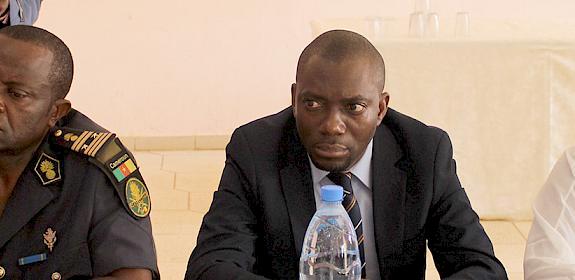AFRICA-TWIX launches in the Republic of Chad
N’Djamena, Chad, 4th March 2020—A national workshop to launch the AFRICA-TWIX platform in the Republic of Chad organised by the Central African Forests Commission (COMIFAC) took place from 3rd–4th March 2020 under the auspices of the Ministry of Environment, Water and Fishery (MEWF) for Chad, in collaboration with TRAFFIC.
TWIX (Trade in Wildlife Information eXchange) platforms consist of a centralised website which holds records on national, regional and international wildlife seizures, and a mailing list which allows enforcement officials to communicate, seek assistance and alert one another about relevant enforcement actions.
TWIXs have been operating in Europe since 2005, with AFRICA-TWIX and SADC-TWIX launched in Central Africa in 2016 and Southern Africa in 2019 respectively, and one in Eastern Africa is under development.
In January 2019, Chad became the sixth member of the AFRICA-TWIX platform since its establishment in February 2016, out of the total of ten countries in the COMIFAC zone.
The latest meeting brought together 46 participants including government officials from different ministerial departments MEWF, Customs, Justice, Police, and Gendarmerie plus representatives of COMIFAC, INTERPOL, GIZ and TRAFFIC.
During the two days, the merits of AFRICA-TWIX as a tool in addressing illegal wildlife trade (IWT) were presented with practical demonstrations. The meeting also offered an opportunity for deeper reflections on how to improve law enforcement efforts in Chad in collaboration with its neighboring countries, in particular Cameroon and the Central African Republic (CAR).
Talking during the open ceremony, Mr Kimto Olivier the Deputy Director of MEWF, representative of the Minister said ‘’Chad will surely make effective use of the AFRICA-TWIX platform in fighting against IWT and improving its collaboration with other countries of COMIFAC in addressing wildlife crimes”.
At the end of fruitful deliberations, the government of Chad through MEWF also committed to:
- Increase efforts to ensure the effective use of the AFRICA-TWIX platform.
- Build collaboration and cooperation between the Ministry in charge of wildlife and other wildlife law enforcement agencies in charge, and with other countries in Central Africa.
In the same vein, Mr Chouaibou Nchoutpouen, Expert in charge of biodiversity on behalf of the Executive Secretary of COMIFAC, said: “This launch meeting—which coincides with the celebration of the international wildlife day 3rd March—is a proof and symbol of conservation progress as it provides an opportunity for Chad to implement key recommendations made at the N’Djamena international Conference of Ministers in charge of defence, security and protected areas in the fight against poaching and other transboundary criminal activities held in N’Djamena between 23rd and 25th January 2019, urging the promotion of transboundary collaboration and information exchange in fighting against wildlife crime through tools like AFRICA-TWIX developed by COMIFAC and TRAFFIC”.
AFRICA-TWIX has already produced significant results including the facilitation of collaborative efforts between enforcement bodies in eight regional and international investigations on elephant ivory and pangolin scales. This workshop came as a follow up of TRAFFIC’s commitment during the COMIFAC biannual planning meeting to speed up the operationalisation of AFRICA-TWIX in all COMIFAC countries, with an imminent priority focus on Chad and Rwanda. This falls within the framework of the implementation of Central African countries’ Wildlife Trade Action Plan (PAPECALF)[1]. As part of the implementation of this plan, TRAFFIC and, COMIFAC launched the AFRICA-TWIX platform in February 2016, to strengthen collaboration and exchange of information between law enforcement agencies in Central African countries aimed at reducing the illegal trade in wild fauna and flora.
“We have come such a long way from the four pilot countries at the outset of AFRICA-TWIX which has now expanded to include eight countries (Cameroon, Congo, Gabon, CAR, DR Congo and Chad, Rwanda and Burundi) with Burundi recently stating their intent to join the platform and with Chad operationalising its AFRICA-TWIX engagement today this augurs well the future of regional enforcement collaboration,“ said Sone Nkoke, a senior representative of TRAFFIC who attended the workshop.
“TRAFFIC welcomes these important steps in the implementation of the AFRICA-TWIX platform for information exchange in Central Africa in general, and particularly in Chad, which to date stands as the only Sahelian country on the platform. As such, AFRICA-TWIX has a critical role to play in backstopping Chadian authorities’ efforts to counter the activities of wildlife traffickers armed with small arms and ex-military weapons and operating within the equatorial forests of the Congo Basin”.
Acknowledegments
The establishment and implementation of AFRICA-TWIX has been supported by the German government’s Partnership against Poaching and Illegal Wildlife Trade (in Africa and Asia), implemented by GIZ on behalf of the German Federal Ministry for Economic Cooperation and Development (BMZ) and the German Federal Ministry for Environment, Nature Conservation and Nuclear Safety (BMU),and by WWF France.
Notes:
1. PAPECALF, from the french acronym « Plan d’Action sous régional des Pays de l’Espace COMIFAC pour le renforcement de l’Application des Législations nationales sur la Faune sauvage » PAPECALF was adopted by all COMIFAC countries in June 2012 for the period 2012–2017. The action plan is currently being review for a new and extended phase.
About DETER

The DETER project is funded by the German Partnership against Wildlife Crime in Africa and Asia, implemented by GIZ on behalf of the German Federal Ministry for Economic Cooperation and Development (BMZ) and the Federal Ministry for the Environment, Nature Conservation, Nuclear Safety and Consumer Protection (BMUV). https://www.giz.de/en/worldwide/66553.html
WWF

WWF is an independent conservation organization, with over 30 million supporters and a global network active in over 100 countries. WWF's mission is to stop the degradation of the Earth's natural environment and to build a future in which humans live in harmony with nature, by conserving the world's biological diversity, ensuring that the use of renewable natural resources is sustainable, and promoting the reduction of pollution and wasteful consumption. Visit www.panda.org/news for the latest news and media resources and follow us on Twitter @WWF_media.





